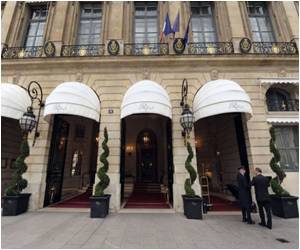
Tens of thousands of shivering South Koreans feel the same way.
Cold Januarys, with average lows of minus 6 to 7 Celsius (21-19 Fahrenheit) and occasionally minus 15 C, are the norm. But this winter there is no escape from the chill.
The government, worried about shrinking power reserves after a shock September blackout, has ordered staff in 19,000 government offices to keep the indoor temperature below 18 degrees C (64 F).
Private buildings including offices must not exceed 20 C (68 F) between December 5 and February 29. Offenders face fines of between 500,000 won ($433) and three million won.
"There have been complaints that working in such a chilly environment is uncomfortable," acknowledged Kim Jeong-Dae, an official at the Knowledge Economy Ministry in charge of enforcing the measures.
Advertisement
Officials from the knowledge economy ministry regularly visit private and government offices and other premises to check room temperatures with thermometers.
Advertisement
"Everyone works wearing a jacket, scarf and gloves because it’s so cold even in the office," said Lee Hae-Woo, 24, an assistant director at state broadcaster Korea Broadcasting System.
"With guards checking the temperature regularly, it’s impossible to heat up more than we are told to. Well, it’s government policy, so what can we do about it?"
Chef Byun said his co-workers, when out of the public eye, swathe themselves in blankets or stuff hot packs in their pockets.
"It’s good trying to cut energy usage but it shouldn’t be too cold, because people’s efficiency really does fall when they feel too frozen to do anything," he told AFP.
"And it gets worse when our guests complain and talk about their ’right to be warm’ in the lobby and restaurants. But we can’t do anything about it."
Not everyone gives the rules a frosty reception. Online shopping malls have been doing a roaring trade.
From early December, major online malls GS shop and D&shop together sold more than 16,000 sets of underwear in less than a month, double the amount even in the unusually cold winter of 2010-2011.
Sales of hot packs and blankets sales increased by more than 20 percent to 3,000 and 2,000 respectively.
"Office workers are at the centre of this spree, as the office temperature is so low that it’s called ’Big Chill training’ for employees," GS shop said in a statement.
The electricity scare was paradoxically caused by unusually warm weather last September, when several power stations were down for maintenance.
As reserves fell dangerously low, authorities briefly imposed rolling blackouts lasting several hours which hit up to 2.1 million households and other premises.
In November, as winter loomed, the government announced its winter power-saving measures. President Lee Myung-Bak urged fellow Koreans to follow his example and don thicker underwear.
Restrictions on neon signs were also announced, although the giant TV screens which dot Seoul’s cityscape are still switched on.
The power-saving drive follows measures imposed in neighbouring Japan to help lower blackout risks last summer, which limited the use of air conditioning following the March tsunami and Fukushima nuclear disaster.
With the majority of its nuclear reactors halted for routine inspections, Japan has also urged businesses and households to reduce consumption this winter.
Unlike Japan, analysts say South Korea’s power problems arise because successive governments have shirked charging consumers a realistic price for electricity.
Britain’s electricity price is about twice that of South Korea.
Critics say the office restrictions are counter-productive because workers smuggle in small fan heaters to hide under their desks.
But despite the complaints, the government is expected to maintain this winter’s policy for the foreseeable future.
"So far, people have followed the policy without much trouble and thanks to that, we are not going through severe electricity shortage issues for now," Kim of the knowledge economy ministry told AFP.
"It takes 10 years to build a nuclear power plant and at least five years to build a liquefied natural gas plant. So we will have to try our best to reduce consumption rather than increase supply."
Source-AFP









